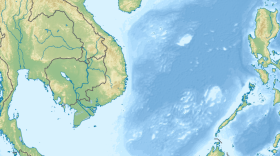In Manila yesterday, Secretary of State John Kerry said that China must accept the ruling of an international court as the basis of negotiations with the Philippines. China rejects the decision that threw out its argument for control over almost all of the South China Sea but, as we hear from Neal Conan in the Pacific News minute, so far all sides have tried to restrain tensions.
Both Beijing and Manila said this week that they hope to negotiate their differences, but, after the ruling by the Permanent Court of Arbitration, starting positions remain very far apart. China offered to open talks if The Philippines was willing to ignore the ruling, but Manila said any negotiations had to be based on the decision, which was almost entirely in its favor. The new President of the Philippines ran as a nationalist and can't be seen to concede sovereign rights, while every school child in China is taught that nearly all of the South China Sea is historically Chinese... a claim the international court threw out earlier this month.
Still, despite a brief rash of nationalist tweets and calls to boycott Philippine and American products, China's government has not reacted angrily and, at his meeting with Secretary Kerry Yesterday, Philippine Foreign Minister Perfecto Yasay said he hoped China could come up with a position to allow talks to begin as soon as possible.
Last week, Admiral John Richardson, the Chief of Naval Operations, met with his Chinese Counterpart in Beijing. Admiral Wu Shengli said China will continue to build up its artificial islands, Admiral Richardson said the US will continue its Freedom of Navigation Patrols, but both commanders also emphasized the importance of professional behavior to mitigate risks. Five Chinese vessels are currently in Hawaiian waters to participate in RIMPAC 2016, and during his visit, Admiral Richardson said he confirmed plans for a US Navy port visit to China in the near future.




